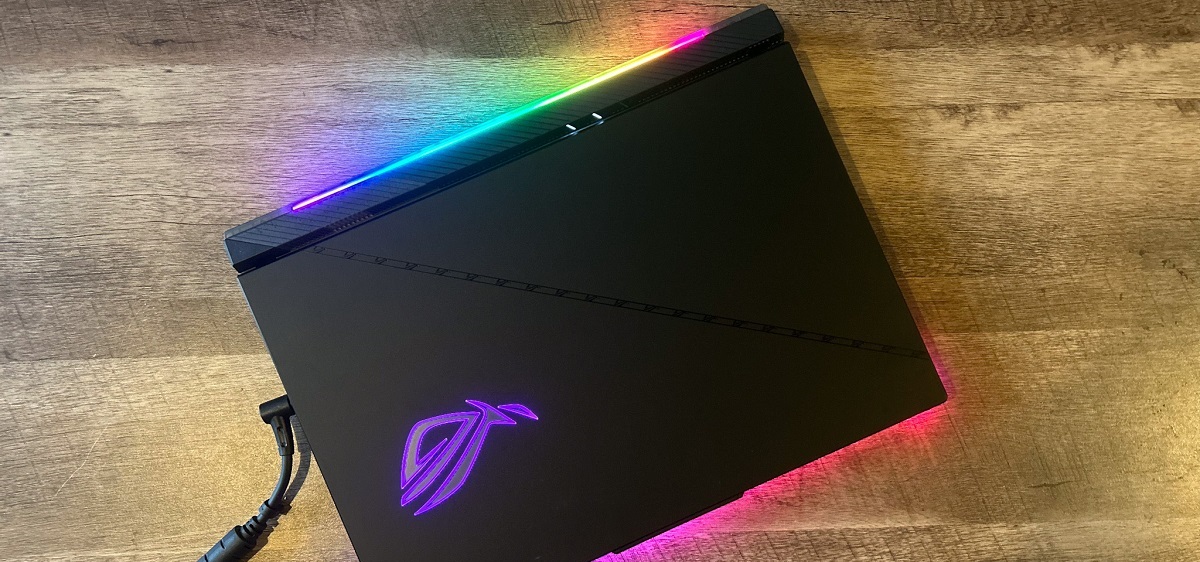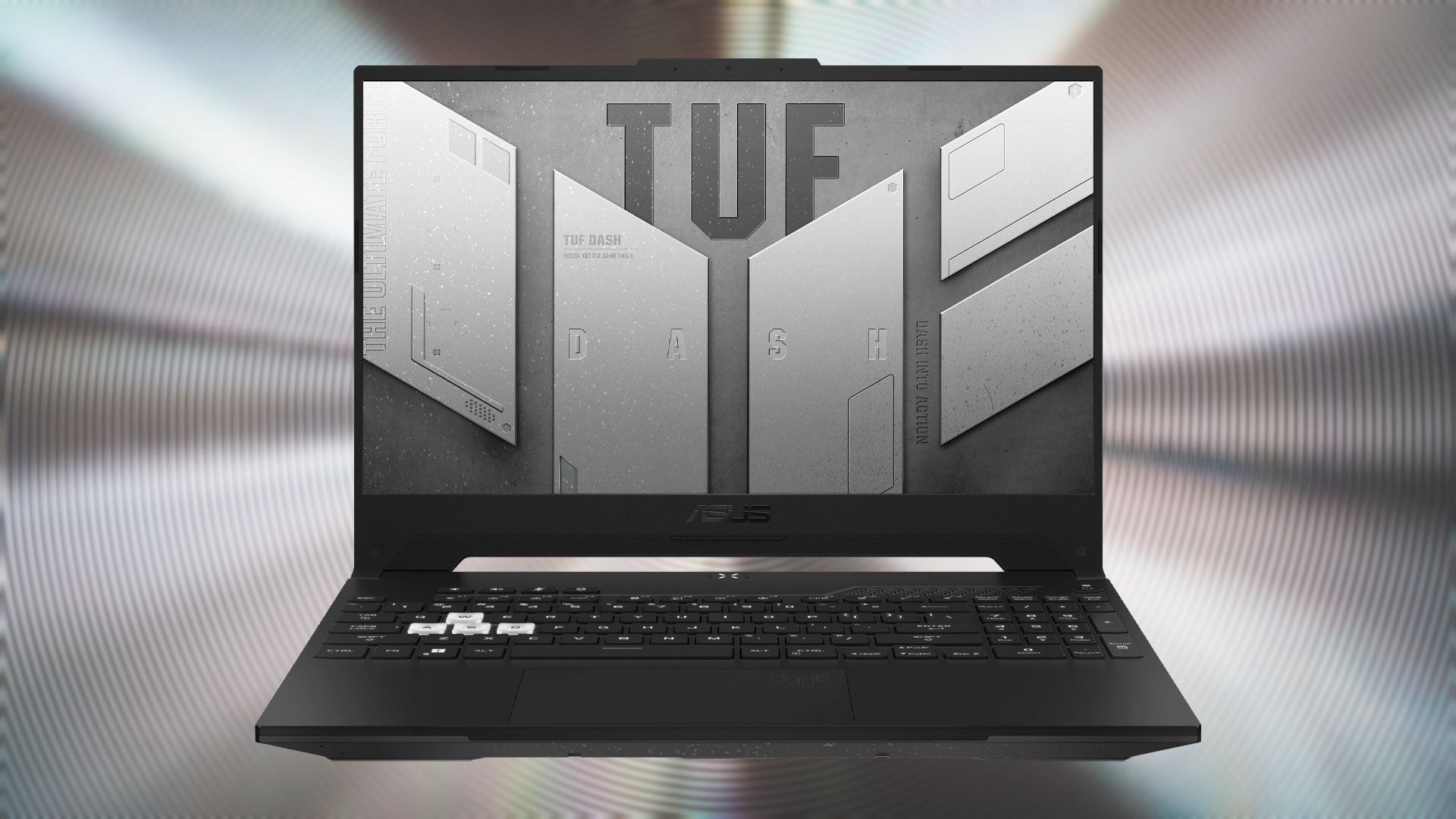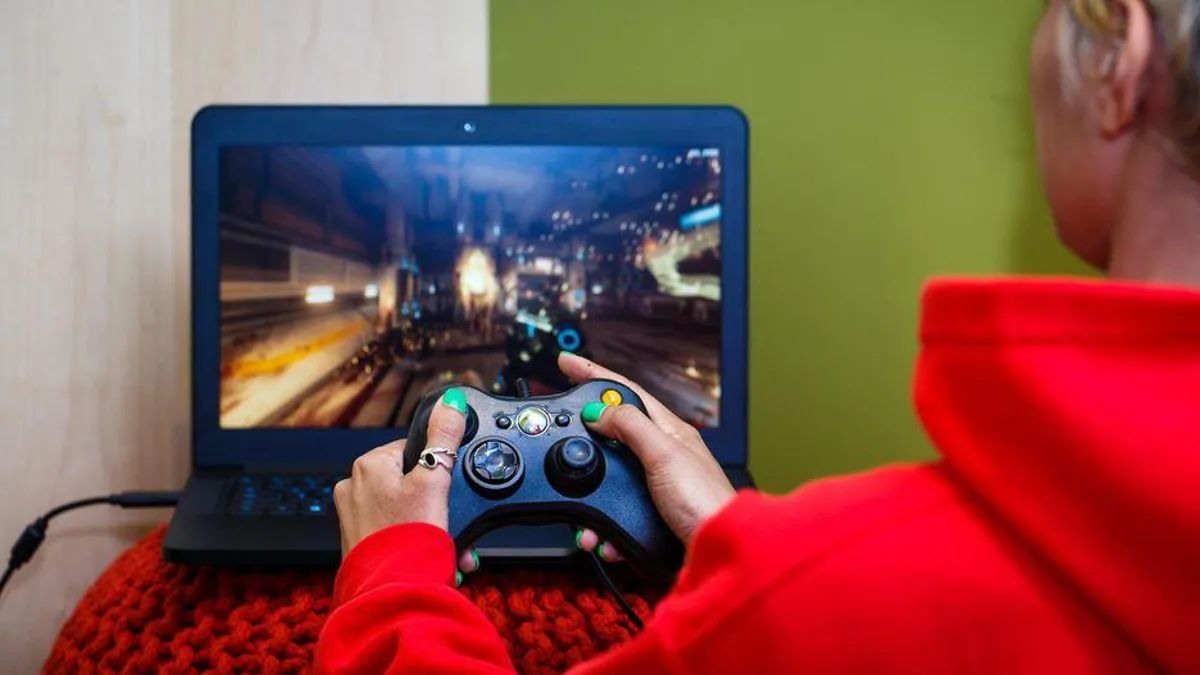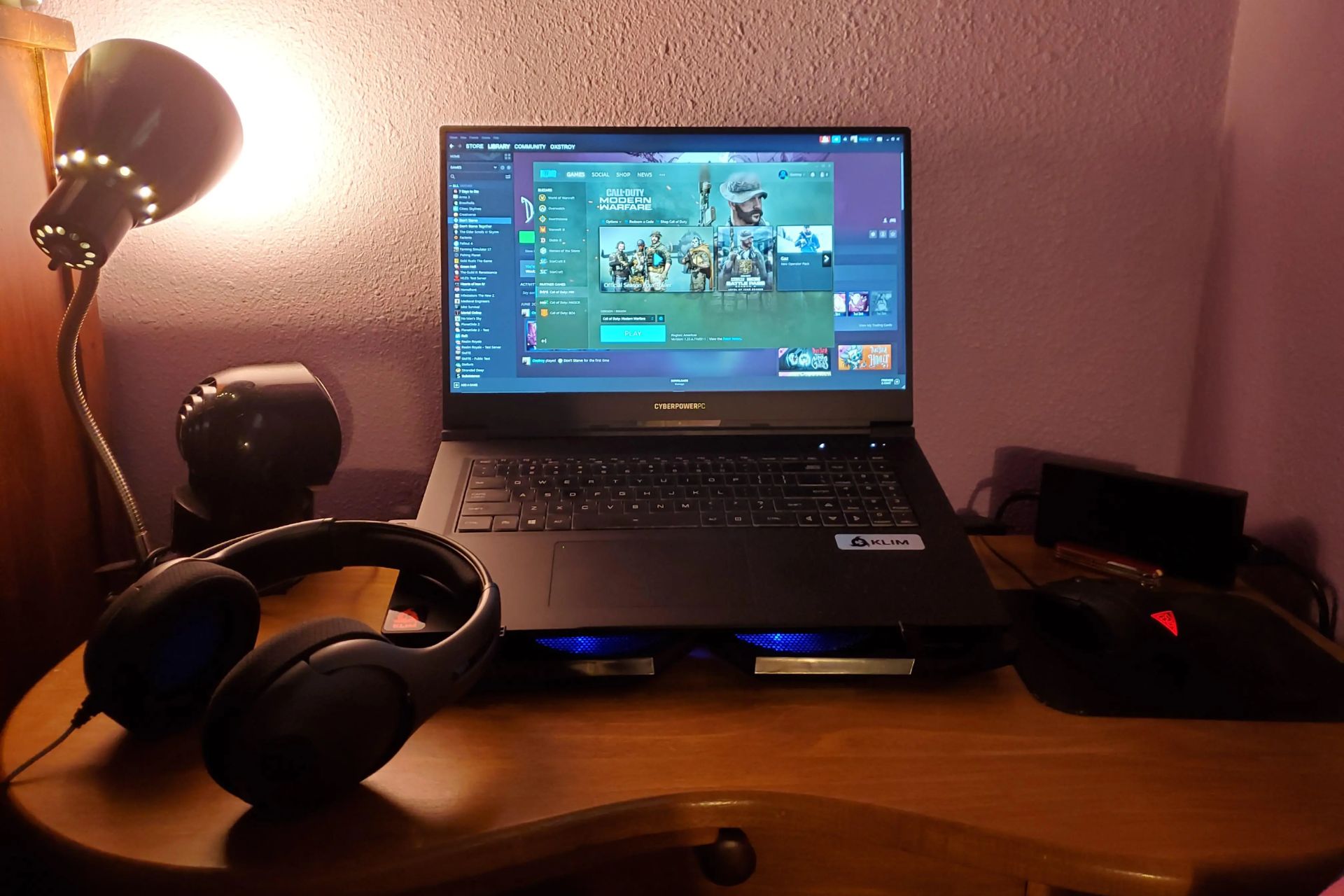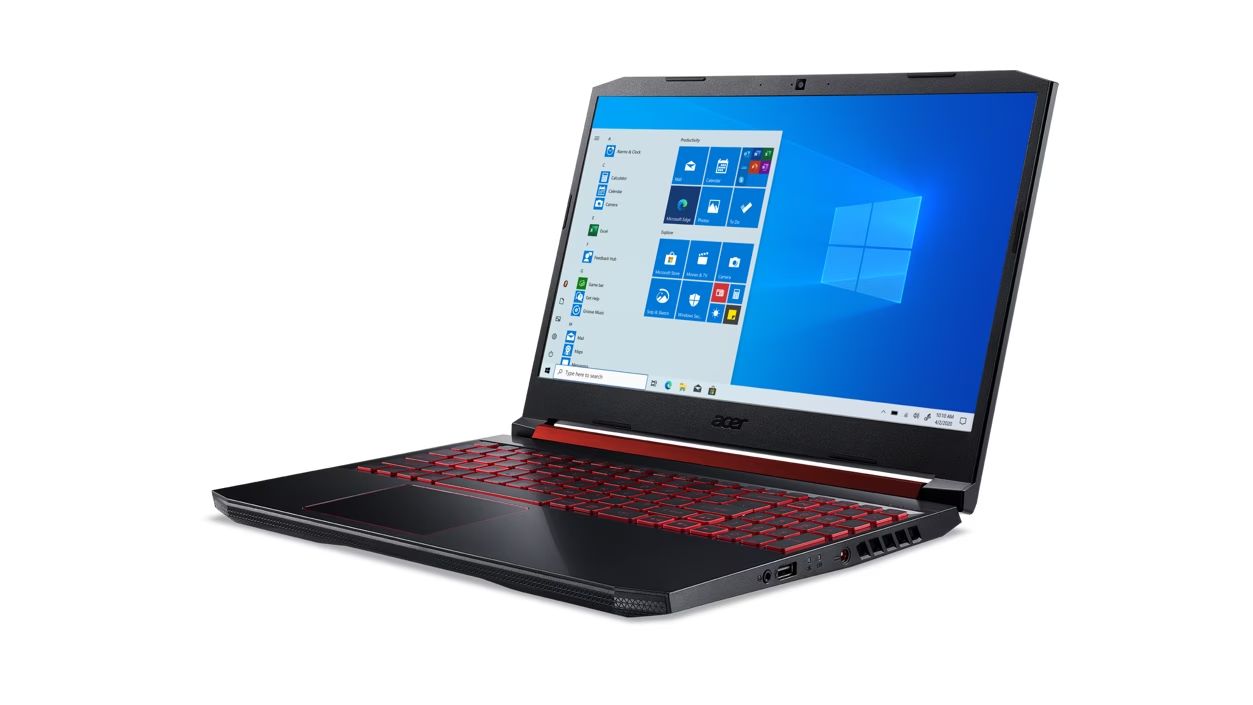Introduction
Welcome to the world of gaming laptops, where power, performance, and portability combine to create an immersive gaming experience. Whether you’re a casual gamer or a hardcore enthusiast, a gaming laptop is a must-have device that allows you to take your gaming adventures with you wherever you go.
Unlike traditional laptops, gaming laptops are specifically designed to handle the demanding requirements of modern games. They boast powerful processors, cutting-edge graphics cards, and high-resolution displays, all packed into a sleek and portable form factor.
Gaming laptops have evolved significantly over the years, offering immense processing capabilities that rival even some desktop computers. With advancements in technology, gaming laptops can now deliver smooth gameplay, stunning graphics, and immersive audio, making them the preferred choice for gamers who want uncompromised performance on the go.
But what exactly sets a gaming laptop apart from a regular laptop? In this article, we will delve deeper into the key features that make gaming laptops stand out, including performance, graphics, display, cooling system, keyboard and touchpad, storage options, portability, battery life, and price range. Whether you’re new to the world of gaming laptops or looking to upgrade your current setup, this guide will provide you with all the information you need to make an informed decision.
What is a Gaming Laptop?
A gaming laptop is a specialized type of laptop that is designed and optimized for gaming purposes. Unlike regular laptops that are primarily focused on productivity and general tasks, gaming laptops prioritize delivering the best gaming experience possible.
Gaming laptops are equipped with powerful hardware components that are capable of handling demanding games with high graphical fidelity and smooth performance. These components include high-performance processors, dedicated graphics cards, ample RAM, and fast storage options.
One of the most significant differences between a gaming laptop and a regular laptop is the graphics processing unit (GPU). Gaming laptops are equipped with dedicated GPUs, specifically designed to handle complex graphics calculations required by modern games. These powerful GPUs ensure smooth gameplay and allow users to play games at higher resolutions and graphics settings.
Furthermore, gaming laptops often feature larger displays with higher refresh rates and resolutions. This enhances visual immersion and provides a more immersive gaming experience. Additionally, gaming laptops may have specialized cooling systems to dissipate the heat generated by the high-performance hardware, preventing any thermal throttling that could negatively impact performance.
In terms of design, gaming laptops often feature a more aggressive and gaming-inspired aesthetic. They may incorporate RGB lighting, customizable keyboards, and other gaming-specific features to enhance the overall gaming experience.
It’s important to note that while gaming laptops are primarily geared towards gaming, they can also handle everyday tasks such as web browsing, video streaming, and content creation. This makes them versatile devices that can be used for both work and play.
In summary, a gaming laptop is a powerful and specialized device that is specifically designed to deliver an optimal gaming experience. With high-performance hardware, dedicated graphics cards, and immersive displays, gaming laptops allow gamers to enjoy their favorite games with superior graphics and performance, all in a portable and versatile form factor.
Key Features of a Gaming Laptop
When it comes to gaming laptops, there are several key features that set them apart from regular laptops. These features are specifically designed to enhance the gaming experience and ensure optimal performance. Let’s explore some of the essential features to look for in a gaming laptop:
- Performance: Gaming laptops are equipped with high-performance processors, such as Intel Core i7 or AMD Ryzen processors. These powerful CPUs ensure smooth gameplay and handle the demanding requirements of modern games.
- Graphics: The dedicated graphics card is one of the most crucial components of a gaming laptop. It allows for realistic visuals and smooth rendering of complex graphics. NVIDIA GeForce and AMD Radeon are popular GPU brands among gamers.
- Display: Gaming laptops often feature high-resolution displays with fast refresh rates. A Full HD (1920×1080) or 4K (3840×2160) resolution ensures sharp and detailed visuals, while a high refresh rate, such as 144Hz or 240Hz, provides smooth motion and reduced screen tearing.
- Cooling System: Gaming laptops produce a significant amount of heat due to their powerful components. A robust cooling system with multiple heat pipes, fans, and vents is crucial to maintain optimal performance and prevent overheating.
- Keyboard and Touchpad: Gaming laptops often come with specially designed keyboards with customizable RGB lighting and anti-ghosting technology. A comfortable and responsive keyboard enhances gameplay, while a precise and smooth touchpad is essential for navigation during non-gaming activities.
- Storage Options: Fast storage is important for quick game loading times. Gaming laptops typically offer options for solid-state drives (SSDs) that provide faster read and write speeds compared to traditional hard disk drives (HDDs). Some gaming laptops also offer dual-drive configurations for a combination of speed and storage capacity.
- Portability and Battery Life: While gaming laptops are generally larger and heavier than regular laptops, there are options available that offer a balance between portability and performance. Battery life is also a consideration if you plan to use the laptop on the go, as gaming can be power-intensive.
- Price Range: Gaming laptops can vary widely in price, depending on the specifications and features. You can find budget-friendly options with decent gaming performance or high-end models with top-of-the-line components.
These key features should guide you in selecting a gaming laptop that meets your gaming needs. Whether you prioritize performance, graphics, display quality, or portability, finding the right balance of features is essential for an exceptional gaming experience.
Performance
When it comes to gaming, performance is paramount. A high-performance gaming laptop ensures that you can play the latest games smoothly and without any lag or stuttering. Here are some key factors to consider when evaluating the performance of a gaming laptop:
- Processor: The processor, or CPU, is the brain of the laptop. Look for a gaming laptop with a powerful processor, such as an Intel Core i7 or AMD Ryzen CPU, as these will offer the best performance for gaming. The higher the clock speed and the more cores the processor has, the better it will handle tasks like gaming.
- RAM: Random Access Memory (RAM) is crucial for gaming performance. Aim for a laptop with at least 8GB of RAM, but if your budget allows, consider 16GB or even 32GB for optimal performance. More RAM allows for smoother multitasking and faster loading times.
- Storage: The type of storage in a gaming laptop can impact performance. Solid State Drives (SSDs) are faster than traditional Hard Disk Drives (HDDs) and provide quicker load times for games and faster file transfers. Consider a gaming laptop with an SSD or a combination of SSD and HDD for ample storage space.
- Graphics Card: The graphics card, or GPU, is the heart of a gaming laptop and plays a crucial role in delivering smooth and immersive gaming experiences. Look for a dedicated graphics card, such as an NVIDIA GeForce or AMD Radeon, with a higher VRAM capacity for better performance in graphically demanding games.
- Benchmark Scores: Benchmark scores can provide insights into the overall performance capabilities of a gaming laptop. Look for laptops with high scores in gaming benchmarks like 3DMark or PCMark, as these indicate that the laptop can handle demanding games with ease.
It’s important to note that gaming laptops with higher performance specifications tend to be more expensive. However, investing in a high-performance gaming laptop ensures that you can enjoy the latest games at their full potential without compromising on frame rates or visual quality.
In summary, when evaluating the performance of a gaming laptop, consider the processor, RAM, storage, graphics card, and benchmark scores. Finding a laptop with a powerful combination of these components will ensure smooth and lag-free gaming experiences, allowing you to fully immerse yourself in your favorite games.
Graphics
Graphics play a vital role in the gaming experience, and having a capable graphics card in your gaming laptop is crucial for optimal visual performance. Here are the key aspects to consider when evaluating the graphics capabilities of a gaming laptop:
- Dedicated Graphics Card: Gaming laptops come equipped with dedicated graphics cards from leading manufacturers such as NVIDIA GeForce and AMD Radeon. These dedicated GPUs are specifically designed to handle complex graphics calculations required by modern games. They provide superior performance compared to integrated graphics found in regular laptops.
- VRAM: Video Random Access Memory (VRAM) is the dedicated memory of the graphics card. Look for a gaming laptop with higher VRAM capacity, as this allows for smoother gameplay and better performance in graphically demanding games. GPUs with 4GB or 6GB of VRAM are suitable for most games, while 8GB or higher is recommended for more demanding titles.
- Max-Q Design: Some gaming laptops feature NVIDIA’s Max-Q design, which optimizes the power and efficiency of the graphics card. Max-Q laptops are thinner and lighter while still delivering impressive gaming performance. They strike a balance between power and portability.
- Ray Tracing: Ray tracing is a cutting-edge technology that creates more realistic lighting and reflections in games. NVIDIA’s RTX series graphics cards support ray tracing, providing a visually stunning and immersive gaming experience. If you want the latest in graphics technology, consider a gaming laptop with an RTX graphics card.
- Refresh Rate: The refresh rate of the display is essential for smooth and fluid visuals. Gaming laptops often offer higher refresh rates than regular laptops, such as 144Hz or 240Hz. The higher the refresh rate, the smoother the gameplay, resulting in reduced motion blur and sharper image clarity.
- Resolution: Gaming laptops typically offer at least a Full HD (1920×1080) resolution display. Some higher-end models may even offer 4K (3840×2160) resolution. Higher resolutions provide more detailed visuals, but keep in mind that higher resolutions can be more demanding on the graphics card, potentially impacting performance.
Choosing a gaming laptop with a powerful and capable graphics card ensures that you can enjoy games with stunning visuals and immersive graphics. The graphics card plays a significant role in determining the level of detail, frame rates, and overall visual quality of your gaming experience.
Remember to check the system requirements of the games you intend to play to ensure that the graphics card in your chosen gaming laptop meets or exceeds the recommended specifications. This way, you can fully enjoy the rich graphics and immersive environments that modern games have to offer.
Display
The display of a gaming laptop is an essential factor that significantly impacts your gaming experience. A high-quality display can enhance visual immersion, improve clarity, and make games more enjoyable. Here are the key aspects to consider when evaluating the display of a gaming laptop:
- Resolution: Gaming laptops typically offer various display resolutions, ranging from Full HD (1920×1080) to 4K (3840×2160) and beyond. Higher resolutions provide more detail and sharper images. Keep in mind that higher resolutions may require more powerful hardware to maintain smooth frame rates.
- Refresh Rate: The refresh rate refers to the number of times the display refreshes per second. Higher refresh rates, such as 144Hz or 240Hz, result in smoother motion, reduced screen tearing, and a more responsive gaming experience. Consider a gaming laptop with a higher refresh rate if you prioritize smooth visuals.
- Response Time: Response time measures how quickly pixels can change from one color to another. A lower response time, typically measured in milliseconds (ms), reduces motion blur and ghosting, resulting in sharper and more fluid visuals, especially in fast-paced games.
- Color Accuracy: Color accuracy is crucial for an immersive gaming experience. Look for gaming laptops with displays that cover a wide color gamut, such as sRGB or Adobe RGB, for accurate and vibrant colors. Additionally, consider a laptop with an IPS (In-Plane Switching) panel for wider viewing angles and better color consistency.
- Screen Size: The screen size of a gaming laptop can vary, typically ranging from 13 inches to 17 inches or larger. Larger screens provide a more immersive gaming experience, but they also make the laptop bulkier and less portable. Choose a screen size that suits your preferences and needs.
- Anti-Glare Coating: Gaming laptops often come with anti-glare coatings that reduce reflections and minimize eye strain. This is particularly important if you play in well-lit environments or near windows where glare may be an issue.
When evaluating gaming laptop displays, consider the resolution, refresh rate, response time, color accuracy, screen size, and anti-glare properties. It’s important to find a balance between these factors based on your gaming preferences and the types of games you play.
Ultimately, a high-quality display can greatly enhance your gaming experience by immersing you in vivid visuals and allowing you to see every detail of your games with stunning clarity.
Cooling System
The cooling system of a gaming laptop is a crucial aspect that ensures the optimal performance and longevity of the hardware components. Gaming laptops generate a significant amount of heat due to their powerful processors and dedicated graphics cards. A robust cooling system helps dissipate this heat effectively, preventing thermal throttling and maintaining stable performance. Here are the key factors to consider when evaluating the cooling system of a gaming laptop:
- Heat Pipes: Gaming laptops often feature heat pipes that help transfer heat away from the critical components of the laptop, such as the CPU and GPU. Heat pipes are capable of efficiently carrying and dispersing the heat, allowing the cooling system to function optimally.
- Fans: Gaming laptops use fans to circulate air and dissipate heat. Look for laptops that have multiple fans or higher fan speeds, as these can provide better cooling performance. Some laptops even have advanced fan control systems that allow you to adjust fan speeds manually.
- Vents and Airflow: Adequate airflow is critical for cooling. Gaming laptops typically have strategically placed vents and air intake areas to allow cool air to enter and hot air to escape. Laptops with well-designed airflow systems ensure that heat is efficiently expelled, preventing overheating.
- Cooling Technologies: Some gaming laptops come equipped with advanced cooling technologies, such as vapor chambers or liquid metal cooling solutions. These technologies provide enhanced heat dissipation and can effectively keep temperatures lower under heavy gaming loads.
- Cleaning and Maintenance: It’s important to keep the cooling system clean to maintain optimal performance. Regularly cleaning the air vents and fans will prevent dust buildup, which can impede airflow and increase temperatures. Some laptops feature accessible panels for easy cleaning and maintenance.
- Software Optimization: Some gaming laptops offer software utilities that allow you to optimize fan speeds and monitor system temperatures. These utilities ensure that the cooling system is running at its best and can help prevent overheating during intense gaming sessions.
A well-designed cooling system is crucial for maintaining the performance and longevity of a gaming laptop. By effectively dissipating heat, a robust cooling system ensures that the hardware components can operate at optimal temperatures, allowing gamers to enjoy uninterrupted gaming sessions without worrying about thermal throttling or reduced performance.
Consider the presence of heat pipes, the number and speed of fans, the quality of airflow, additional cooling technologies, and the ease of maintenance when evaluating the cooling system of a gaming laptop.
Keyboard and Touchpad
The keyboard and touchpad of a gaming laptop play an essential role in providing a comfortable and responsive gaming experience. These input devices are crucial for precise control and navigation during gameplay. Here are the key aspects to consider when evaluating the keyboard and touchpad of a gaming laptop:
- Keyboard: Look for a gaming laptop with a keyboard specifically designed for gaming. Key features to consider include:
- Key Travel: Adequate key travel provides a satisfying typing and gaming experience. Look for a laptop with keys that have a comfortable and responsive feel when pressed.
- Anti-Ghosting and N-Key Rollover: These features ensure that multiple simultaneous key presses are registered accurately, allowing for precise control during intense gaming sessions.
- Backlighting: Gaming laptops often feature customizable RGB backlighting options. This allows you to personalize the keyboard backlight color and patterns to create an immersive gaming atmosphere.
- Macro Keys: Some gaming laptops offer extra programmable keys, often located on the side of the keyboard, for quick access to in-game commands or macros.
- Touchpad: While gaming primarily relies on a mouse, the touchpad is still essential for regular laptop use and non-gaming activities. Consider the following aspects:
- Size and Responsiveness: A larger touchpad with accurate tracking and smooth gestures enhances user experience during non-gaming activities.
- Physical Buttons: Look for a touchpad with dedicated physical buttons, as they provide more precise control and enhance usability.
- Multi-Touch Gestures: The ability to perform multi-touch gestures, such as scrolling and zooming, can make navigation and productivity tasks more intuitive.
Having a comfortable and responsive keyboard and touchpad is crucial, not only for gaming but also for everyday laptop usage. A well-designed keyboard with the right features and a touchpad that provides smooth and accurate tracking ensures seamless interaction with your gaming laptop.
Remember to consider your personal preferences regarding key travel, backlighting, and additional features like macro keys. Additionally, it’s always a good idea to try out the keyboard and touchpad in person if possible to ensure that they meet your specific needs and preferences.
Storage Options
The storage options of a gaming laptop are an important consideration, as they determine how much space you have for games, applications, and other files. Gamers require fast and ample storage to accommodate large game files and ensure quick loading times. Here are the key storage options to consider when evaluating a gaming laptop:
- Solid-State Drive (SSD): SSDs are the preferred storage option for gaming laptops due to their fast read and write speeds. They provide quick game loading times, reduced loading screens, and snappy system responsiveness. Look for gaming laptops that offer SSDs with sufficient capacity to store your games and other data.
- Hard Disk Drive (HDD): Although not as fast as SSDs, HDDs offer larger storage capacities at a lower cost per gigabyte. They are suitable for storing large media files, such as videos or music, that do not require the speed of an SSD. Some gaming laptops offer a combination of an SSD and HDD, allowing you to have both speed and storage capacity.
- Hybrid Drives: Hybrid drives combine the best of both worlds by incorporating both an SSD and an HDD into a single drive. They use the SSD portion for frequently accessed data, speeding up overall performance, while utilizing the larger HDD portion for mass storage.
- Storage Capacity: Consider the amount of storage you need based on the size of your game library and other files. Gaming laptops typically offer storage options ranging from 256GB to 1TB or more. Keep in mind that games are increasing in size, so it’s advisable to have ample storage to accommodate your growing collection.
- Expandability: Check if the gaming laptop allows for easy storage upgrades. Some laptops have accessible slots or bays that allow you to add or replace storage drives without voiding the warranty.
When deciding on storage options, consider your budget, the number and size of games you plan to install, and your overall storage needs. A combination of fast and ample storage ensures that you have enough space for your games and other files while enjoying shorter loading times and quicker system performance.
Ultimately, having the right storage options in your gaming laptop contributes to a smooth and enjoyable gaming experience by allowing you to quickly access your favorite games and keep them organized on your system.
Portability and Battery Life
Portability and battery life are important considerations for gamers who want to take their gaming experience on the go. While gaming laptops are generally bulkier and heavier than ultrabooks or traditional laptops, advancements in technology have made them more portable than ever before. Here are the key factors to consider regarding portability and battery life when choosing a gaming laptop:
- Weight and Size: Gaming laptops come in various sizes, typically ranging from 13 to 17 inches or larger. Consider the laptop’s weight and dimensions to ensure it’s portable enough for your needs. Lighter laptops are easier to carry, while larger ones offer bigger screens for a more immersive gaming experience.
- Battery Capacity: Gaming laptops are power-hungry machines, and high-performance components consume a significant amount of energy. Look for a gaming laptop with a larger battery capacity to ensure longer battery life. Keep in mind that intense gaming sessions will drain the battery quickly, so don’t rely solely on battery power for extended playtime.
- Battery Life: Check the estimated battery life of the gaming laptop, which is typically provided by manufacturers. Keep in mind that battery life varies depending on usage. Gaming laptops usually offer around 4-6 hours of battery life for general usage, but this may be significantly reduced during gaming sessions.
- Power Saving Features: Some gaming laptops offer power-saving features or software settings that allow you to optimize battery usage. These features can help extend battery life by reducing power consumption when you’re performing non-demanding tasks.
- Charging Options: Consider the availability and convenience of charging options. Look for laptops that offer fast-charging capabilities or support USB-C charging for added convenience when you’re on the move.
- Heat Dissipation: Portability can be affected by the laptop’s cooling system. Ensure the cooling system efficiently dissipates heat, as prolonged gaming sessions can generate substantial heat. A well-designed cooling system prevents thermal throttling and maintains optimal performance and long-term durability.
Balance your desire for portability and battery life with the performance requirements of your preferred games. Remember that powerful gaming laptops tend to prioritize performance over portability, so it’s important to find a laptop that strikes the right balance for your specific needs.
In summary, gaming laptops offer varying levels of portability and battery life. Consider the weight, dimensions, battery capacity, estimated battery life, power-saving features, charging options, and heat dissipation when choosing a gaming laptop that meets your preferences for both mobility and uninterrupted gaming sessions.
Price Range
Price range is an important consideration when purchasing a gaming laptop, as it can vary significantly based on the specifications and features offered. Gaming laptops generally fall into three main categories: budget-friendly, mid-range, and high-end. Here’s a breakdown of the price range and what you can expect within each category:
- Budget-Friendly: Budget gaming laptops typically range from around $700 to $1000. These laptops offer decent gaming performance for casual gamers or those on a tighter budget. They may have entry-level or mid-range processors, dedicated graphics cards, and moderate storage options.
- Mid-Range: Mid-range gaming laptops usually fall in the $1000 to $1500 price range. These laptops offer a balance between price and performance with better specifications. They may have more powerful processors, dedicated graphics cards with higher VRAM, faster storage options, and improved display and cooling systems.
- High-End: High-end gaming laptops are designed for serious gamers or professionals who demand top-tier performance. These laptops typically start from $1500 and can go well beyond $3000. High-end gaming laptops feature top-of-the-line processors, powerful dedicated graphics cards, ample RAM, fast storage options, high-resolution displays with high refresh rates, advanced cooling systems, and premium build quality.
It’s important to determine your budget and assess your gaming needs before deciding on a price range. Consider the types of games you’ll be playing, the desired graphical settings, and your long-term gaming ambitions. While high-end gaming laptops offer top performance, entry-level or mid-range laptops can still deliver a satisfactory gaming experience for casual or less demanding gamers.
Remember to factor in additional costs such as accessories, extended warranties, or any customization you may want to make. It’s also a good idea to compare prices from different retailers and keep an eye out for sales or discounts that can help you get the best value for your money.
In summary, gaming laptops come in a wide range of price points, from budget-friendly to high-end models. Evaluate your gaming needs, consider your budget, and find a gaming laptop that offers the best balance of performance and affordability for your specific requirements.
Conclusion
Gaming laptops have revolutionized the gaming experience, allowing gamers to enjoy their favorite titles on the go without compromising performance. Throughout this article, we have explored the key features that make gaming laptops stand out from regular laptops.
We learned that gaming laptops prioritize performance, offering high-performance processors, dedicated graphics cards, ample RAM, and fast storage options to handle the demands of modern games. The graphics capabilities of gaming laptops are essential for delivering stunning visuals, with dedicated graphics cards that support high resolutions, high refresh rates, and advanced technologies like ray tracing.
The display of a gaming laptop is crucial for an immersive gaming experience, with options for high resolutions, high refresh rates, and accurate color reproduction. The cooling system plays a vital role in maintaining optimal performance by dissipating heat effectively and preventing thermal throttling.
The keyboard and touchpad are critical considerations, offering features like responsive keys, customizable backlighting, anti-ghosting, and precise touchpad tracking. Storage options vary, with solid-state drives providing fast loading times, and hard disk drives or hybrid drives offering larger storage capacities.
Portability and battery life are important factors for gamers on the go, with lightweight designs, long-lasting batteries, and efficient cooling systems contributing to a satisfactory gaming experience outside of a traditional gaming setup. Finally, the price range of gaming laptops varies to accommodate different budgets and requirements.
Now armed with an understanding of these key features, you can make an informed decision when selecting a gaming laptop that suits your gaming preferences, budget, and lifestyle. Whether you’re a casual gamer or a dedicated enthusiast, a well-equipped gaming laptop will elevate your gaming experiences to new heights.







